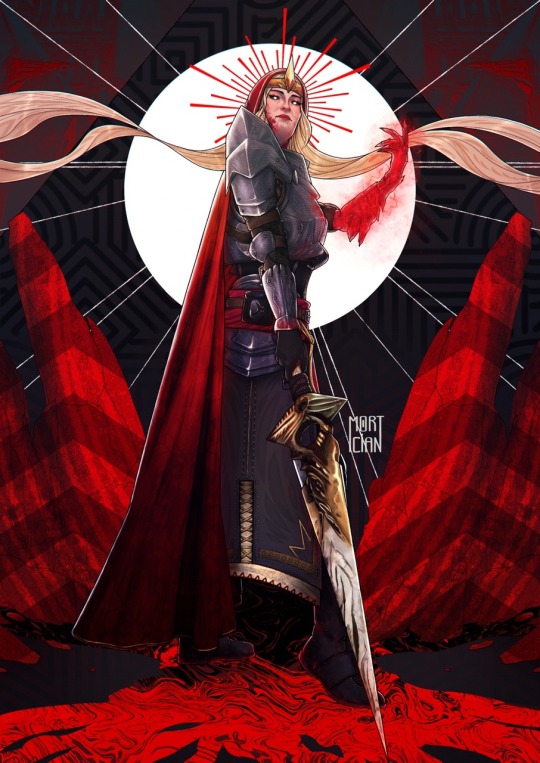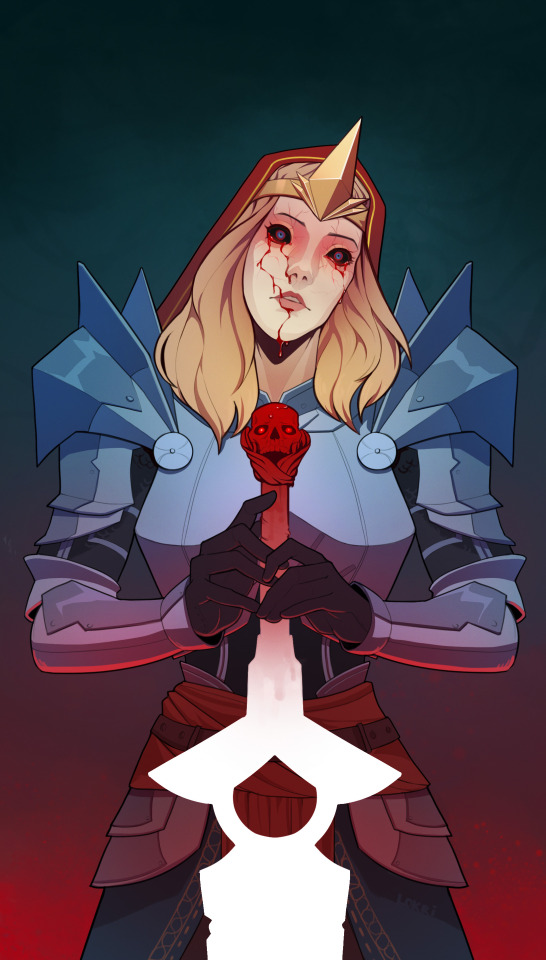#Meredith Stannard
Explore tagged Tumblr posts
Text

my poor little meow meow 💔💔💔
1K notes
·
View notes
Text
Death of the Self - Part 3
Read on AO3
Part 1 - Test of Faith // Part 2 - Bury Your Morals
Meredith Stannard x Elizabeth Hawke
Summary: Elizabeth and Meredith meet once again and their relationship takes a new step.
word count: 1172

Meredith stood in her office, looking at the window, hands behind her back as she waited for the Champion to arrive. She hoped one letter would be enough to bring the mage to her door - it wouldn’t be wise if she went to the Estate.
And why would she do that? It’s not as if she cared about the Champion’s wellbeing. Meredith shook her head, as she heard a knock on the door, recognizing the voice. She called her in and turned around to face her.
“Knight-Commander.” The Champion nodded as she greeted Meredith, though unlike other times, there was no smirk on her face. Meredith’s eyes slightly narrowed as she looked at her.
“Champion.” She nodded. “You made quite the abrupt exit, last we spoke. Was there a reason for it?”
Elizabeth sucked in a breath. “I was feeling ill, so I left.”
“Is that so?” Meredith crossed her arms. “I wouldn’t imagine that the Champion of Kirkwall would cower at the sight of blood.”
The Champion gave her a tight smile. “I assure you, it wasn’t the blood that upset my stomach.”
“Then what was it?”
“It is…a personal matter, that I would rather not speak of.” She crossed her arms. “Besides, I doubt you care.”
There was a pause before she replied. “I do not. However, the Champion disappearing for a week afterwards is cause to worry.”
“There is no need. It was just a sickness. I am better now.”
“Good.”
For a moment, neither spoke. She half expected for the mage to simply walk away, but instead, after a heavy sigh, she asked “Was there a reason why you called me here, Knight-Commander?”
Meredith mulled over the question for a moment. Why had she asked the Champion to come, after all?
Her original intentions were to congratulate the Champion on her work, but there was a twisted and vile part of Meredith that wanted something else entirely.
She took a step forward.
.
Elizabeth watched as Meredith put her hands behind her back before saying “I must say, you surprised me.”
She wasn’t sure if that was a good or a bad thing to hear from her.
“And how did I do that?”
“I did not believe you would do it. That you, of all people, would turn so easily on your fellow mages.” Meredith began to walk towards her and on instinct, Elizabeth took a small step behind, gulping. “And yet, I was wrong.”
Elizabeth couldn’t tell if she was shaming or praising her. She did not like either of her options.
Meredith took another step forward. “It appears, Champion, that you are not only a defender of the city, but a defender of the faith as well.”
She could hear her heart beating faster, like a trapped animal in a cage as Meredith continued to talk.
“It is good to have someone else who takes their duty to the Maker seriously, even if you are an apostate.”
Elizabeth forced a smirk, trying to appease the beast. “Unlike what you templars think, we are not all beyond saving.” She said, betraying herself once more.
Meredith took another step forwards and Elizabeth felt like her feet were rooted to the ground. If she ran, it would undo all she had done, but she feared what staying would mean.
The templar gave her an unreadable look, and she was close, too close for Elizabeth’s taste.
Her legs ached, begging her to run. And yet, she only raised her head to look at Meredith.
Meredith nodded. “Not all hope is lost, it would seem.”
They stared at each other, feet almost touching. Elizabeth waited for her to do…anything. To move back and dismiss her with a wave of her hand, to reach for her weapon or to even start preaching the Chant.
She could not have predicted Meredith’s next course of actions, however.
A mouth, one who so easily preached hate against mages, came crashing down on hers.
Elizabeth’s mind could barely comprehend what was happening. For an instant, she felt as if she had fallen into a dream while awake, and she hoped for the moment she’d wake up.
That moment never arrived. The pain she felt as Meredith’s hand found her hair, tugging and pulling and not letting her go was real. The other hand, the one gripping her waist and then rising to undo the laces of her clothes was real, and Meredith’s invasive tongue on her mouth was real.
Elizabeth should have run. She should have screamed. She should have never even agreed to come to the Gallows in the first place.
But what she should not have done was to close her eyes, and give in to it. Part of her knew she had no other option but to play along. If Meredith wanted to do this, she had no choice but to comply - she was, after all, a mage inside of a templar building.
But there was a small part of her who was intrigued by this development. A part of her that even took a strange enjoyment out of this.
She didn’t think Meredith would ever be…interested in such things, but given the look in her eye once Elizabeth was naked, it appeared that the Knight-Commander’s little spiel about how it was a bad look for templars to go to have such open sexual relations was not something that applied to her.
Maybe there was something to be gained from this, Elizabeth thought to herself, as she began to remove the templar’s armor. If Meredith was willing to lay with her, then she truly trusted Elizabeth like she hadn’t before.
Three lives for the sake of so many others.
It was wrong, the reasonable part of herself screamed as the two touched each other. But Elizabeth was already beyond saving. She had condemned herself on that beach and this was the price of her betrayal.
One life, hers, for the sake of many others. It wasn’t so bad. The benefits outweighed the costs. Meredith would turn a blind eye to what she did, she would stay away from her friends, and all Elizabeth had to do was to continue to play pretend, and let Meredith do to her what she wanted. It was not even the first time Elizabeth had even warmed someone else’s bed for personal gain.
And Meredith wasn’t so bad, right? She was at least a better lover than Meeran ever was.
Those thoughts remained with Elizabeth until they were both sweaty and spent, and Meredith promptly put her clothes back on and left without even a kiss goodbye.
She felt bruises in many places, from the templar’s roughness, but it was nothing she could not handle, she told herself as she dressed herself. At the very least, all injuries were hidden beneath the various leathers she put on.
No one needed to know what transpired in Meredith’s office, and the less they knew, the better. Elizabeth gave herself enough scrutiny as it was.
Maker. What had she gotten herself into?
.
Thanks for reading! If you liked this fic, please consider reblogging it and leaving a comment, they're extremely appreciated!
#elizabeth hawke#meredith stannard#meredith x elizabeth#elizadith#meredith x hawke#merehawke#hawkedith#dragon age 2#dragon age 2 fanfic#da2 fanfic#da2 fic#da2#knight-commander meredith stannard#purple hawke#mage hawke#female hawke#warden's writing
28 notes
·
View notes
Text

✦︎ Queen of Swords ✦︎
#dragon age#dragon age 2#meredith stannard#knight commander meredith#biowaregames#bioware fanart#fanart#digital art
2K notes
·
View notes
Text

Blessed are they who stand before The corrupt and the wicked and do not falter.
#dragon age#dragon age ii#dragon age 2#knight commander meredith#meredith stannard#buriedinembers#hello anon from some months ago who sent me an ask and said that they liked my old meredith art#if you see it i dedicate this one to you#your ask was one of the reasons i ultimately decided to replay dao/da2 after 7+ years and finally beat dai#and then i did it all
3K notes
·
View notes
Text


Have you heard of the tragedy of the Champion of Kirkwall?
+ Bonus
The og post that made me go insane

#dragon age#dragon age 2#fanart#varric tethras#hawke#ive been slowly going insane thinking about how in da2 you lose no matter what you do or change#silver fox varric#femhawke#leandra amell#knight commander meredith#meredith stannard#first enchanter orsino
21K notes
·
View notes
Text




And no rivers and no lakes can put the fire out I'm gonna raise the stakes I'm gonna smoke you out
#anders#dragon age 2#dragon age#anders dragon age#da2#daedit#da2edit#dragonageedit#da2 anders#justice#cullen rutherford#meredith stannard#grand cleric elthina#fenris#gamingedit#my gifs#my gifs: da2
1K notes
·
View notes
Text




Meredith: Champion, do you think I got to be the Knight-Commander of Kirkwall by being late? Hawke: No, you got there by back-stabbing and ass-kissing. Meredith: Maybe so, but I started those things promptly at 8. Hawke:
301 notes
·
View notes
Text
do you think there’s a thedosian version of the “bush did 9/11” conspiracy theory where people believe meredith blew up the hightown chantry
697 notes
·
View notes
Note
are you being a good girl

#Marian Hawke#Varric Tethras#Meredith Stannard#Dragon Age 2#da2#see these things are always funnier in my mind#never funny when I actually execute them LMAO#but I wanted to draw something it's been a while#my art
357 notes
·
View notes
Text

#dragon age#dragon age 2#dragon age fanart#meredith stannard#antagonist#my art#digital artist#artists on tumblr#red templars
3K notes
·
View notes
Text

I got a venom like a snake running out of my mouth It's got you burning at the stake Innocent or not, you're not a bet I care to take
#dragon age#dragon age 2#meredith stannard#she's my fave da villain like yeess go insane with paranoia!! be so convinced you're right that you model yourself after a prophet!!
990 notes
·
View notes
Text

mini merehawke to brighten my day
#my art#dragon age 2#dragon age#knight commander meredith#meredith stannard#marian hawke#meredith x hawke
656 notes
·
View notes
Text

okay, y'all can have another merehawke. as a treat
#dragon age 2#marian hawke#meredith stannard#still technically gonna tag this#puppy kink#f!hawke#hawke#fem hawke#merehawke#dragon age#doomed yuri#wlw art#toxic yuri#meredith x hawke#meredith stannard x hawke#hawkedith#Spotify
210 notes
·
View notes
Text
someone has to have done this before me, but every time I see this meme this is all I can picture

#chia draws#dragon age#da2#cullen rutherford#meredith stannard#this is it you don’t have to play DA2 that’s the plot#bunch of found family homosexuals fuck with the authorities looney-toon style#hilarious that this would actually take out like. a big chunk of Hawke’s group#marian hawke#hawke da2#shitpost
2K notes
·
View notes
Text

Meredith
780 notes
·
View notes
Text
While writing that Dragon Age 2 post the other day, I made a narrative connection I had never made before.
I was writing about the Templar route, and about how the game makes no bones about how the Templar route is the evil route, it's clearly narratively marked as such. Because the structure of the game sets itself up from the start to make Hawke have some sympathy for the mages: they are the child of a mage and the sibling of a mage. This is an issue that Hawke cannot exempt themselves from having opinions on.
But that said, yes, you can choose the Templar route. You can decide that the tragedy of your family being ripped apart by the mage plight has hardened Hawke's heart against them. You can join forces with the Order that has hunted your family members their whole lives. You can choose to tighten the iron fist, instead of choosing to break it. You can become the ruler of Kirkwall. You can kill your sister.
And then I realized: That's Meredith's story.
Meredith, whose sister was a mage, the sister who died from it and ripped her family apart in the process. Meredith, who hardened her heart against people like her sister and dedicated the rest of her life to punishing others like her. Meredith, who joined causes with the Templar order who made that happen. Meredith, who took over the city.
You can choose to become Meredith. The game lets you do that. But you have to know -- as you climb over her corpse to ascend her bloodied throne -- that it's not a 'good' choice.
#meredith stannard#hawke#dating age 2#da2 meta#you can choose to be meredith or you can choose to be anders#you can choose the violence of the rebel or the violence of the state#but you can't abstain from the choice#the game won't let you do that
1K notes
·
View notes